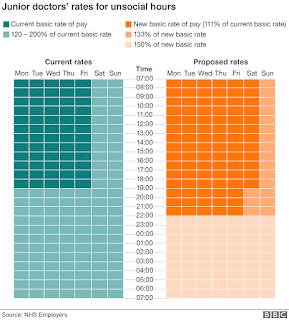In the last few months junior doctors all over the UK have
been heavily objecting the proposed changes to the junior doctor contract
proposed by the government, which has led to a 24-hour strike of over 90% of
the UK's junior doctors, leaving the NHS in a state of distress.
This opposition has arisen as the government has decided
that the current contracts are ‘unfair’ and too old-fashioned, and even though
the initial plans for a new contract were first drawn up in 2012, talks only
started breaking down in 2014. The government has indicated it will impose the
new contract in England and the British Medical Association (BMA) has responded
by initiating the industrial action process.
So, what
exactly is a ‘junior doctor’? The term ‘junior doctor’ refers to doctors which
have just graduated from medical school up to doctors which have had up to 10
years’ worth of experience being a fully qualified doctor- to most people a
32-year old hospital specialist would seem to be a ‘senior’ and well-qualified
doctor. The starting salary for a junior doctor is currently just under £23,000
a year, but with additional payments for extra services such as unsociable
hours, this can quite easily top £30,000.
Junior doctors at the top end of the spectrum can earn just
over £70,000 per year. However, it's important to remember these doctors often
make life-and-death decisions and carry out surgery, in addition to having over
10 years’ worth of professional experience as a qualified doctor.
Given that
1/3 of all doctors in England are junior doctors, this contract change will
directly affect around 55,000 doctors, making it a lot harder so earn more
money and work healthy hours.
The proposed changes to the contract will change the
standard working hours for junior doctors in England, which are currently set
at 0700-1900 Monday-Friday, which is already quite long and is certainly a
strain on the NHS. What the new contract proposes is that these standard hours
would change to 0700-2200 Monday-Friday in addition to 0700-1900 on a Saturday-
which is, in my opinion, quite ridiculous as this implies that working on 0800
on a Monday morning is the same as working on a 1900 on a Saturday evening. As the standard number of hours has
increased, it means that junior doctors will have to work practically all week
to earn a decent pay for the first few years or their careers.
Another problem which will almost certainly arise is extreme
tiredness and fatigue, which is already a problem within much of the NHS and
will be made even more common with these new changes. With this proposed
change, therefore, comes the question of patient safety, as it has been proven
that doctors make more mistakes practicing medicine whilst being tired than
drunk, which ultimately poses the question: to what extent would you be
comfortable with an exhausted surgeon operating you who is more likely to make
a mistake than a surgeon under the influence of alcohol?
The main problem the government is trying to solve here is
timings: in an ideal world, they would like to see a 24/7 NHS which everyone
has complete access to; however, they are trying to do this without spending
huge amounts of money by employing more doctors, and so, there is only one
foreseeable solution without spending huge amounts of money- to stretch the
capacity of NHS doctors.
Personally, as a prospective medical student I think that
this change in contract has very few proper advantages, as, even if we have a
fully running 24/7 NHS, what is the point if barely any of the doctors are
working to their full potential and putting the lives of thousands of patients
at risk every day?

